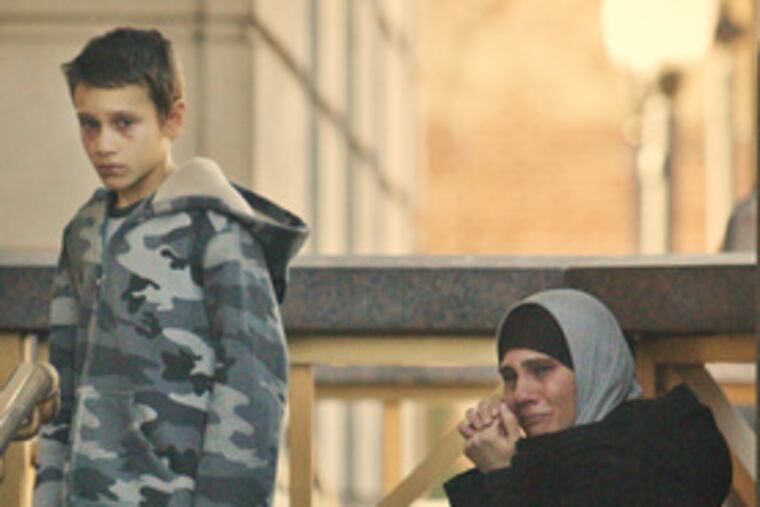Jury finds Fort Dix 5 guilty of conspiracy
IN THE VIDEO that set off the Fort Dix terrorism investigation, a succession of jarring gunshots rings out in a snow-covered forest in the Poconos.

IN THE VIDEO that set off the Fort Dix terrorism investigation, a succession of jarring gunshots rings out in a snow-covered forest in the Poconos.
A similar, jarring sound turned heads on the fourth floor of the federal courthouse in Camden yesterday, when a tearful teenager punched a wooden door with every ounce of his frustration.
Minutes earlier, brothers Dritan, Eljvir and Shain Duka, along with Mohamad Shnewer, of Cherry Hill, and Philadelphia resident Serdar Tatar, were convicted of conspiracy to kill military personnel at Fort Dix in South Jersey, securing a key victory for the government in its effort to prevent terrorist attacks before they happen.
All of the evidence collected during the 14-month investigation, including training videos in the Poconos, 200 hours of recorded conversations, the purchase of assault rifles and a wide assortment of bloody and violent jihadist images, led to one conclusion for the government: these men were inspired by al Qaeda and Osama bin Laden to start a holy war in the United States by killing soldiers at Fort Dix.
"These criminals had the capacity and had done preparations to do serious and grievous harm to members of our military," Ralph Marra, the acting U.S. attorney for New Jersey, said after the verdict was delivered.
The jury of eight women and four men agreed, but they didn't convict the foreign-born Muslims of attempted murder charges. Four of the defendants were also convicted of weapons charges.
The conspiracy verdict alone means that the five men likely will spend the rest of their lives in a federal prison when sentenced in April.
"We're going to ask for the maximum sentence allowed," Marra said.
That realization left the defendants' families in various stages of grief after the verdict - from the calm, bleary-eyed silence of Shnewer's father to the outrage in his mother's voice.
"They are the terrorists, not my son," Faten Shnewer said in the courthouse lobby, referring to prosecutors, as she shook her fist while cameras flashed in her face. "This not right. It's not fair and it's not justice."
When confronted with several incriminating quotes her son said about the United States and its armed forces, Faten Shnewer said her son was "pushed" to say them.
Inside the courtroom, as the defendants were led away in shackles by federal marshals, Ferik Duka remained stoic, locking eyes with his three sons and pointing upward.
"Only god can judge," he told his sons as they craned their necks to get in one last smile with parents, siblings and children.
The youngest Duka, Burim, channeled his rage through his fist, and courthouse security staff rushed him into an elevator after he slammed a bathroom door and punched another.
Defense attorneys for the five men spent the bulk of the eight-week trial attacking the credibility, motives and morality of the government's two informants, both career criminals who worked for the FBI in exchange for cash, possible citizenship and other incentives.
The defense claimed that Mahmoud Omar, an Egyptian national, and Albanian-born Besnik Bakalli both goaded the defendants into talking tough and pressured them to create a conspiracy that didn't exist.
"I don't think there would have been a plan without their involvement," said attorney Rocco Cipparone, who represents Shnewer.
Omar conducted surveillance of several military bases with Shnewer, obtained a map of Fort Dix from Tatar, and helped set up the purchase of four M-16 machine guns and three AK-47 assault rifles with Dritan and Shain Duka. Omar spent 13 days on the stand - more than any other witness in the case. Under direct examination, he simply watched videos and confirmed dates and times of conversations he recorded.
Cross-examination was contentious for Omar, however, and he often argued with defense attorneys when they brought up his finances, criminal background and family.
At one point, he suggested that his life would forever be in danger for testifying.
One of the defendants, Serdar Tatar, actually contacted police about Omar's insistence that he provide a map to the base.
Tatar's sister, Serpil, said that her brother did the right thing, trusted the American judicial system and was let down in the worst way.
"He thought Omar was the terrorist," said Tatar, whose family owned a restaurant near the base. "He was trying to protect his family."
The investigation began when a clerk at a Mount Laurel, Burlington County, Circuit City contacted police after watching a video that the defendants had dropped off to be copied.
That video, taken in January 2006, depicts the defendants, and others who were not charged, firing weapons on a snow-covered shooting range, but also calling for jihad and praising Allah.
Several of the defense attorneys questioned whether the men, all devout Muslims, could ever receive fair and equal treatment from the public, prosecutors and their peers in the post-9/11 era.
Marra, in a post-verdict news conference, scoffed at that notion.
"I can't accept that at all," he said. "The verdict was based solely on the words and actions of these defendants."
The anonymous jury, which deliberated for six days, declined to speak with reporters after the verdict was read but issued a statement read by Judge Robert Kugler that said, in part, that the case "has been one of the most difficult things that we have ever had to do."
None of the defendants, who range in age from 23 to 30, testified, but their attorneys said that they would more than likely address the court in April when sentenced. *